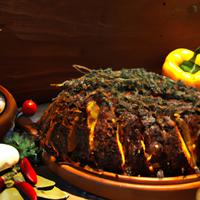
1 serving (85 grams) contains 200 calories, 22.0 grams of protein, 12.0 grams of fat, and 0.0 grams of carbohydrates.

Log this food in SnapCalorie

Nutrition Information
Calories |
555.6 | ||
|---|---|---|---|
% Daily Value* |
|||
| Total Fat | 33.3 g | 42% | |
| Saturated Fat | 13.9 g | 69% | |
| Polyunsaturated Fat | 0 g | ||
| Cholesterol | 194.4 mg | 64% | |
| Sodium | 166.7 mg | 7% | |
| Total Carbohydrates | 0 g | 0% | |
| Dietary Fiber | 0 g | 0% | |
| Sugars | 0 g | ||
| protein | 61.1 g | 122% | |
| Vitamin D | 0 mcg | 0% | |
| Calcium | 27.8 mg | 2% | |
| Iron | 6.9 mg | 38% | |
| Potassium | 833.3 mg | 17% | |
* Percent Daily Values are based on a 2,000 calorie diet. Your daily values may be higher or lower depending on your calorie needs.
Food Attributes
Source of Calories
About Beef shoulder roast
Beef shoulder roast, also known as chuck roast, is a flavorful cut of meat taken from the shoulder area of the cow. Rich in protein and essential nutrients like iron, zinc, and B vitamins, it supports muscle development and overall energy levels. This versatile cut is a staple in American and European cuisines, commonly used in slow-cooked dishes such as pot roast, stews, and pulled beef. Its marbling and connective tissues contribute to a tender texture and bold flavor when cooked properly, especially through braising or roasting. While beef shoulder roast provides nutritional benefits including amino acids for recovery and immune support, it is also higher in fat, particularly saturated fat, which should be consumed in moderation as part of a balanced diet. Choosing leaner preparations or pairing it with nutrient-rich vegetables can enhance its health profile while maintaining its satisfying taste.



